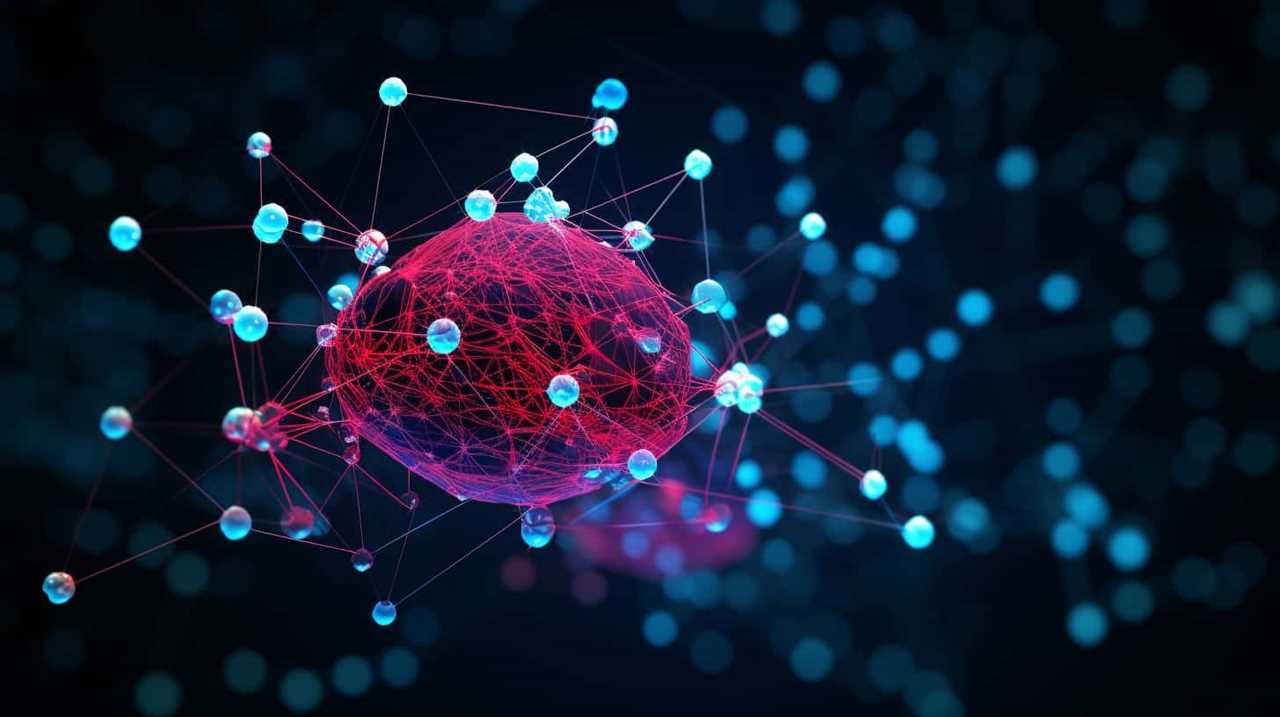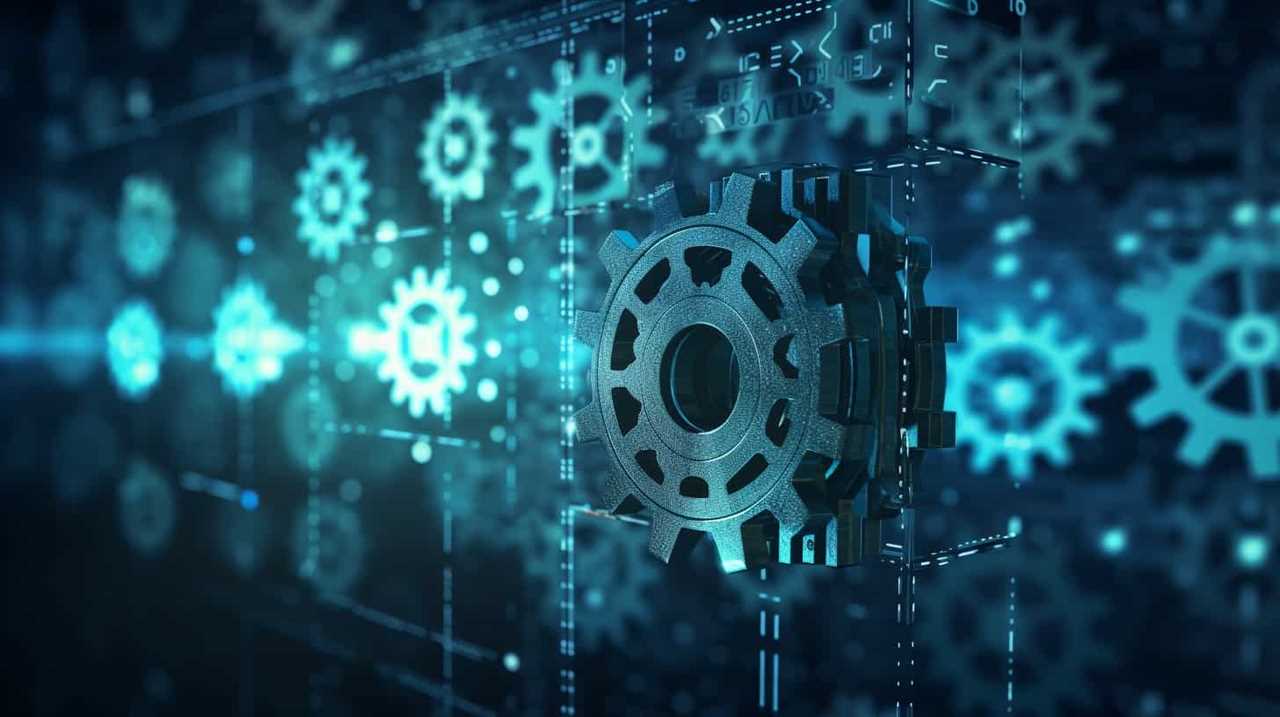I have always believed that our data is our most valuable asset. In today’s digital age, it is essential to safeguard it from cyber threats.
That’s why I’m excited to share with you the power of AI security. By harnessing the capabilities of artificial intelligence, we can strengthen our data’s defenses like never before.
Join me as we delve into the world of AI security and uncover the truth behind its role in safeguarding our precious information.
Key Takeaways
- AI security revolutionizes data protection against cyber threats
- Challenges of implementing AI security include data privacy and potential bias in algorithms
- AI enhances cybersecurity efforts through threat detection and machine learning
- AI-driven threat detection identifies and mitigates risks in real-time

The Rise of AI Security
The rise of AI security has revolutionized the way organizations protect their data from cyber threats. As we look towards the future of AI security, it’s clear that this technology will play a crucial role in safeguarding sensitive information.
With the increasing sophistication of cyber attacks, traditional security measures are no longer enough. AI security offers a proactive approach, utilizing machine learning algorithms to detect and prevent threats in real-time.
However, implementing AI security does come with its own set of challenges. Organizations must navigate issues such as data privacy, the need for skilled professionals, and the potential for bias in AI algorithms.
Despite these challenges, the benefits of AI security far outweigh the risks, making it a vital investment for any organization serious about protecting their data.

Understanding Cyber Threats
An understanding of cyber threats is essential for effectively implementing AI security. To fully comprehend the impact of cyber threats on businesses, it’s crucial to identify common cyber attack techniques. Here are five key points to consider:
- Phishing: The use of deceptive emails or messages to trick individuals into divulging sensitive information.
- Malware: Malicious software that infiltrates systems to steal, damage, or disrupt operations.
- Social Engineering: Manipulating individuals through psychological tactics to gain unauthorized access to systems.
- DDoS Attacks: Overwhelming a network or website with a flood of traffic to render it inaccessible.
- Ransomware: Encrypting a victim’s data and demanding payment for its release.
Understanding these techniques allows organizations to better protect their data and systems.
Transitioning into the next section, let’s explore how harnessing the power of artificial intelligence can enhance cybersecurity efforts.

Harnessing the Power of Artificial Intelligence
Now, let’s delve into how I frequently harness the powerful capabilities of artificial intelligence to enhance cybersecurity efforts.
By leveraging AI driven threat detection and machine learning algorithms for data security, I’m able to stay one step ahead of cyber threats.
Through the use of AI, I’m able to analyze vast amounts of data in real-time, detecting patterns and anomalies that may indicate a potential security breach. This proactive approach allows me to identify and mitigate threats before they can cause significant damage.
Moreover, AI enables me to automate routine security tasks, freeing up valuable time and resources for other critical cybersecurity activities.
With AI as a powerful ally, I can ensure that my data is protected against evolving cyber threats.
In the next section, we’ll explore AI’s role in data protection.

AI’s Role in Data Protection
By applying AI to data protection, I can fortify my defenses against cyber threats and ensure the security of my valuable information. AI’s impact on privacy is significant, as it enables advanced techniques for safeguarding sensitive data. Here are five ways AI plays a crucial role in data privacy:
- Real-time threat detection: AI algorithms can analyze vast amounts of data in real-time to identify and respond to potential threats promptly.
- Behavioral analytics: AI can learn and identify patterns of normal user behavior, helping to detect any anomalous activities that may pose a risk to data privacy.
- Automated data classification: AI can automatically classify data based on its sensitivity, ensuring appropriate security measures are in place.
- Enhanced access control: AI can use advanced authentication methods, such as biometrics or facial recognition, to strengthen access control and prevent unauthorized access.
- Data anonymization: AI techniques can anonymize personal data, protecting privacy while still allowing for valuable analysis.
By leveraging AI’s capabilities in data protection, we can strengthen our defenses against cyber threats and safeguard our valuable information from potential breaches.
Now, let’s delve into the next section about strengthening our data’s defenses with AI security.

Strengthening Your Data’s Defenses With AI Security
To bolster my data’s defenses against cyber threats, I will enhance security using AI technology. AI driven threat detection is a powerful tool that can help identify and mitigate potential risks in real-time. By analyzing vast amounts of data and identifying patterns, AI systems can quickly detect and respond to threats that may go unnoticed by traditional security measures. Additionally, AI can play a crucial role in enhancing data privacy. With its ability to analyze and categorize data, AI can help identify sensitive information and ensure that it is properly protected. This can include encrypting data, implementing access controls, and detecting unauthorized access attempts. By leveraging AI security solutions, I can strengthen my data’s defenses and ensure the privacy and integrity of my information.
| AI Security Benefits | Examples |
|---|---|
| Real-time threat detection | Detecting malware and suspicious network activities in real-time. |
| Advanced data encryption | Encrypting sensitive data to protect it from unauthorized access. |
| Access control management | Implementing role-based access controls to restrict data access. |
| Anomaly detection | Identifying unusual behavior and flagging potential security breaches. |
| Automated incident response | Automatically responding to security incidents to minimize damage. |

Frequently Asked Questions
How Do AI Security Measures Differ From Traditional Cybersecurity Methods?
AI security measures differ from traditional cybersecurity methods by leveraging the power of artificial intelligence to analyze vast amounts of data, identify patterns, and detect anomalies in real-time. This offers advantages in data protection and enables proactive threat detection and response.
What Are Some Common Cyber Threats That AI Security Can Help Protect AgAInst?
Artificial intelligence plays a crucial role in detecting malware and preventing phishing attacks. It enhances security measures by analyzing patterns, identifying suspicious activities, and responding promptly to cyber threats.
Does AI Security Require Significant Changes to Existing Data Protection Protocols?
Implementing AI security does require significant changes to existing data protection protocols. The integration of AI brings about advancements in data protection, but it also demands careful consideration of data privacy and the implementation of robust AI security measures.
Are There Any Limitations or Potential Drawbacks to Relying Heavily on AI for Data Protection?
There are limitations and potential drawbacks to heavily relying on AI for data protection. It can be prone to false positives or negatives, lack human intuition, and require significant computational resources.
How Can Organizations Ensure the Ethical Use of AI in Data Security?
To ensure ethical use of AI in data security, organizations must prioritize responsible AI implementation. By incorporating AI ethics into their processes, they can mitigate potential risks and safeguard against unintended consequences.

Conclusion
In conclusion, AI security is the ultimate defense against cyber threats, or so we’re led to believe. With its advanced algorithms and data analysis capabilities, AI promises to protect our valuable information.
However, as we rely more on AI, hackers too can exploit its vulnerabilities. So while AI may seem like the perfect solution, we mustn’t forget that it too can be unmasked by those with ill intent.









